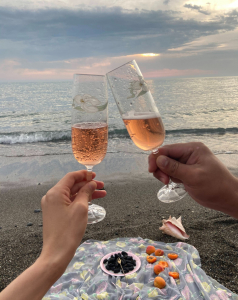
Who doesn’t like to sit with a glass of alcohol after a particularly stressful day and relax? Alcohol has that magical property of lowering your worries and enabling you to let go of them, even if for some time. That short window of time is your escape from the reality that is your life. However, if you have periods, you have that burning question in your mind: “Should I be drinking alcohol when I’m menstruating?” Let’s try to answer the question:
- In this stage, your progesterone and estrogen level falls. This is also known as the menstrual phase.
- The period ends, and the estrogen level in your body increases to a normal level. It is called the follicular phase.
- This is before premenstrual syndrome (PMS) begins. During this time, your estrogen level is at its highest. Medical professionals refer to this as the ovulatory phase.
- This is when you start to experience the symptoms of PMS, such as fatigue, an increase in body temperature, and dizziness. This one is called the luteal phase.
Remember that the effect of drinking alcohol differs depending on which stage of your menstrual cycle you are drinking it.
Alcohol is known to increase the usual discomfort that you experience during periods. Alcohol might increase the level of estrogen and testosterone in your body, causing a hormonal imbalance leading to irregular periods. This irregularity in your menstrual cycle is called amenorrhea.
Another strange side effect of excess alcohol consumption is that it gives you period cravings. You might feel hungry frequently or specifically want a particular food as alcohol causes your body to dehydrate.
The dehydration from alcohol consumption can cause or intensify your period cramps. However, if you end up drinking alcohol during or before your period date, ensure that you compensate your drinking session with an ample amount of drinking water—nothing like a tall glass of refreshing water to balance those pesky dehydration symptoms. Otherwise, after a drinking session, you might experience headaches, moodiness, and tenderness in your breast. Another sign of alcohol consumption is that your period becomes lighter. You are more prone to alcohol consumption during the luteal phase. It is when you should avoid excessive alcohol consumption the most.
During periods there is an expected fluctuation of magnesium in your body. Drinking alcohol further elevates that imbalance and can lead to a lower level of magnesium in your body. A low level of magnesium leads to lower blood sugar, in turn leading to dizziness and cravings.
A glass of alcohol can lead to a high level of estrogen in your blood. You might feel emotional for little or no reason. Another side effect of alcohol you might want to avoid during periods is bloating. Bloating is when you have an abnormal amount of gas or liquid retained in any part of your body. Bloating on regular days causes discomfort, which might escalate when you are on periods.
Drinking alcohol might make you dehydrated, which is not a good idea during periods. Alcohol is a diuretic that increases your urine production, and that leads to dehydration. This dehydration can lead to a headache and worsening of period cramps. So, if cramps are an integral part of your period, you might want to lay off on alcohol intake during periods.
A glass of alcohol is known to make you feel relaxed. However, the same alcohol might make you feel fatigued when you have periods. What’s worst is that women have different alcohol tolerance than men. The alcohol level in blood is mostly always more in women than men, even if they drink the same amount. During periods your tolerance of alcohol reduces. You are more prone to be intoxicated easily than during your regular days.
In conclusion, we can say that a glass or two of alcohol is not wrong during periods provided you compensate with drinking lots of water. However, if possible, try not to consume alcohol during those days not to increase your physical discomfort. If you are in a social situation where you want to drink a glass or two, ensure that you don’t drink those cocktails with lots of sugar and fruity substance in them. Try to keep your drink as small, as sugar-free, and as simple as possible.
Source link:
https://helloclue.com/articles/cycle-a-z/alcohol-cyclehttps://www.ncbi.nlm.nih.gov/pmc/articles/PMC3767933/



